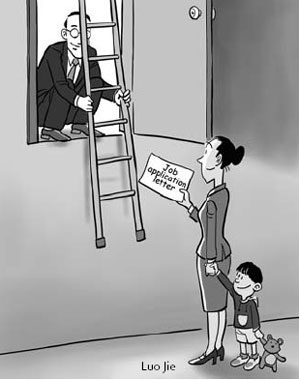Devise new systems for re-employment of mothers
As a career consultant, for the last 10 years I have been organizing classes for women who want to return to work after putting their careers on hold to care for children. I had also quit my job at a department store when I became a mother, but started working again while raising my three children.
I know from experience that one only realizes how fulfilling it is to work after quitting their job.
But it is not easy for anyone, let alone mothers, to land another job once they quit. "My friend took child-care leave and continues to work. Since I was a temporary worker, I quit when I had a baby. When I see my friend working while raising children, I feel as though I alone have been left behind by society," a mother in her 20s from Saitama Prefecture said.
According to a recent survey by the Ministry of Health, Labor and Welfare, 70 percent of working women quit their jobs when they had their first child. Of them, 30 percent quit against their will, citing the difficulty of juggling work and raising children, pressure to quit and other reasons.

I provide career guidance to about 500 people a year. Based on what they tell me, I feel that more women are seeking to return to work after having children. In particular, it is a recent trend that more of them want to do so as soon as possible. Initially, most women attending my career guidance sessions were in their late 30s to 40s, and their children had reached an age where they no longer required constant care.
Now, however, many are in their 20s. Some young mothers whose children are less than 1 year old are taking my sessions while leaving their babies in the care of others.
Money is not the only reason these women want to work again. They also are driven by the need to feel the sense of satisfaction gained from work. Against this backdrop lies their discontent with the fact that even though they are forced to shoulder the responsibility of childcare single-handedly, this is not properly appreciated and recognized by society.
For example, there are few places where mothers can go wheeling a baby carriage. Their husbands are busy and tend to come home very late at night. Many mothers feel trapped at home with their babies. They, as a result, come to develop the feeling that they are "left out of society".
Going back to work provides "a breakthrough" for women under such circumstances. I know from my own experience that I can face my children with a smile when I am a happy worker.
With this in mind, how can mothers find work?
The most important thing is to develop a long-term strategy. I tell women who attend my sessions to make a "family chronology" and a chart of how individual family members spend their day. This is because the fastest way to success is to seek work while keeping in mind how their families will be 10 years from now.
I also encourage them to write down in detail their past work experience, so they can accurately grasp what they can do right now as a worker, or will be able to do with additional training.
Striking a good balance between one's work and personal life is important both for individuals and society.
Many people say they want to attach greater weight to child care while their children are young, and gradually increase their workload as they grow. I want society to accept such a way of working as a norm.
Services to dispatch part-time workers have attracted attention in recent years. The system allows workers to work four hours a day or four days a week, for example, according to their needs. There also are many cases in which workers are hired for their "experiences". There must be a way to realize such a work style for regular employees.
Only employees of major companies can take childcare leave without hesitation-and they can do so more than just once. If re-employment became an option in more companies, it would amount to childcare support and help reverse the declining birthrate.
The government should bolster the expansion of a re-employment system in earnest. I urge it to encourage companies to adopt a system that allows former employees to come back with more or less the same pay they were receiving when they quit.
I also want company officials to stop harboring prejudices. When mothers apply for re-employment, many human resources officials who interview them make such snide remarks as: "You had a long blank period (in your career)." I am also bothered by the way they tend to look at the applicants-with envy or disdain-as if to say, "you had it easy being a homemaker."
The time women spend raising their children is not a "blank period." It is a period in which they play the role expected of mothers. They may be slow in operating computers but such skills can be recovered in a matter of weeks. The same goes for other types of work. An absence from the workplace does not mean these women were cut off from information.
As the workforce shrinks due to declining birthrates and an aging society, it would be unreasonable not to tap into mothers who are willing to work. For that reason, it is important to expand re-employment systems. More than anything else, we need to make a fair assessment of the time mothers have devoted to child care.
The author is a career consultant
The Asahi Shimbun
(China Daily 10/10/2008 page9)














